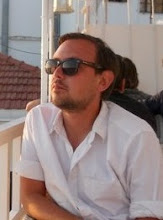
Novelist Graham Greene and director Carol Reed collaborated on three films in the cloying atmosphere of the early Cold War, literate spy thrillers crackling with false propriety in political and climatic extremes. The backdrop of the films — shadow governments thrust into corners of broken worlds — is unmistakably dark, a kind of British noir, but each film feels somehow lightened by Reed's fleet direction: in The Third Man even the cobblestone streets of black market Vienna shimmer after an evening rain.
The postwar city is no longer the center of European civilization but a bruised and crumbling beacon of the cigarette trade; a dead body floats quite innocently among the ice chunks in the river. But instead of a dark, brooding score, Anton Karas' peppy zither causes the foot inevitably to tap. His dementedly happy Viennese Waltz sends up the prim Old World Austrians we almost never see, and who seem, by implication, no longer to exist.
Pulp writer Holly Martins (Joseph Cotten) arrives in Vienna with a job offer from a college buddy, Harry Lime. Unfortunately for Holly, Harry is dead. Unhappy with a British inspector’s accusation that Harry was the head of a deadly penicillin racket, Holly embroils himself in an investigation of his own, picking up a multinational entourage of friends and enemies — Harry's Czech girlfriend, Anna (Alida Valli), a mysterious Romanian, an Austrian porter, spectral Russians lurking over the border — along the way.
The Third Man glories in the utter disorder of the "peace," its tone one of cordial violence: a literary compliment follows a sucker punch; the police graciously conduct an unwarranted search and delicately pursue deportation proceedings. "I don't know what protocol means," says Anna as she's led away by a British officer. "Neither do I, miss," he replies. War disrupts; peace often fails to fix things. Reed's beautiful compositions — the diagonal lines of rooftops and window frames jutting across and away — leave one slightly punch-drunk, like the jagged, uneasy divisions of the four occupying powers or the zig-zag feeling of protocols ignored and unknown. Policies and politics are quickly lost to messy practicalities.
That, of course, is what Holly cannot grasp. As Fowler, the British narrator of Greene's novel The Quiet American says about the titular character, Pyle, "I never knew a man who had better motives for all the trouble he caused." Like Pyle, Holly is a naively idealistic American, wreaking havoc on the delicate structures and strictures of unofficial routes, of "codes" and "channels" and "ways of reading the situation" in the Russian zone or in Saigon. But The Third Man takes a gentler view of Holly than Fowler does of Pyle, mostly because the heroic heights of liberation are still fresh. Things are hunky-dory, for the time being.
When Harry finally appears (a dark and dapper Orson Welles), one feels, as Holly does, snakebit. We've been had, duped, by a devilish man: "Nobody thinks in terms of human beings," he says to justify his killings. "Governments don't. Why should we?" To Harry, the cordial violence of a war zone breeds the art of the con. Neutrality — of the Swiss persuasion — breeds only the cuckoo clock. When Harry tries to escape the closing net of international officials by fleeing through Vienna's cavernous sewers, the scene, sans explosion, doesn’t explain “protocol” any better than that British officer. We’re left only with the sense that, as the inspector notes in his opening voiceover, the four occupiers "did their best, you know."

No comments:
Post a Comment